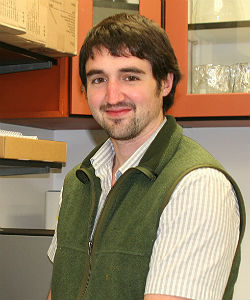
Vandiver Chaplin, Ph.D.
Department: Chemical & Physical Biology, 2018
Faculty Mentor: Charles Caskey, Ph.D.
Dissertation Title: Precision and Selectivity: New Techniques in Image Guided Focused Ultrasound
Dissertation Abstract: Focused ultrasound (FUS) is a non-invasive technology with a growing body of applications in interventional therapy and preclinical research. FUS uses geometrically focused transducers that transmit convergent acoustic fields from outside the body, and by adjusting parameters such as duration, frequency and amplitude, a variety of destructive and non-destructive biological effects can be achieved non-invasively with good spatial precision. FUS may be particularly advantageous in the brain, as no competing method for neuromodulation exists that is both spatially accurate and non-invasive, but further research is required to understand whether acoustic waves affect neural function. FUS research is mainly concerned with mapping acoustic parameters that reliably correlate to biological effects, and developing systems to accurately delivering FUS energy. This work develops tools, techniques, and systems for preclinical FUS investigations in both brain neuromodulation and minimally-intense mild hyperthermia in the body. First, a multi-focal method for mild hyperthermia with reduced cavitation risk is presented, which may be useful in drug-delivery or immune-modulation treatments. Next, a novel approach to optically-tracked FUS is presented. This systems allows real-time targeting of the somatosensory cortex (S1) in non-human primates, estimation of spatial energy distribution and alignment of MR-gradients along the focus for MR-ARFI, and first-ever images of acoustic displacement in a large, living brain. Finally, a new phased-array is developed for S1 targets using a rational design approach. Cortical targeting is evaluated via an unprecedented method for mapping pressure fields in the vicinity of the skull bone.
